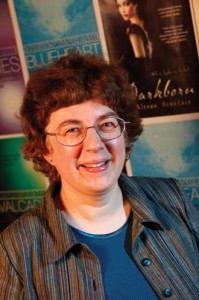
Acclaimed science fiction author also an MD and biomedical researcher
By Mark Shainblum
For someone who obviously thrives on multitasking, Alison Sinclair is the utter opposite of frenetic. Everything she does seems calm and measured. She pauses after every question, thoughtfully considering her answers before committing them to soft, Scottish-accented words.
Sinclair has already accomplished what most people would consider to be several lifetimes’ worth of achievement. She has a BSc in Chemistry, a PhD in Biochemistry, an MD and has worked as a medical writer and a biomedical researcher. In a parallel life, she’s also a science fiction and fantasy author with four critically acclaimed novels to her credit and more on the way. She recently came to McGill to complete yet another post-graduate degree, a Master’s in epidemiology. Feeling inadequate yet?
Born in England to Scottish parents and raised in Edinburgh, Sinclair and her family emigrated to Canada when she was still a child. She credits her interest in science fiction to her adolescent years in Edmonton, where her family was temporarily renting a furnished house.
“I was living in the teenaged son’s room and he had the complete works of John Wyndham and all of James Bond on the bookshelf, and the combination turned me into a science fiction writer,” she said. “That and Star Trek. That was the point in my life when I wrote my first science fiction story. And I persisted in reading it, and writing it despite my elders saying, ‘Haven’t you given up that stuff yet?’”
Sinclair most assuredly did not give it up. Her first novel, Legacies, was published in 1995, just before she entered medical school at the University of Calgary. It’s a complex tale of settlers on a colony world who finally work up the courage to go back to their home planet, which they fear they have accidentally destroyed with their experimental starship drive. The renowned science fiction author Lucius Shepard compared the book’s intricate plotting and “world-building” to the work of past masters like Arthur C. Clarke and Frank Herbert of Dune fame.
Sinclair’s second novel Blueheart, written in the midst of her medical studies, was received with equal enthusiasm, and her third, Cavalcade, was nominated for the prestigious Arthur C. Clarke award for the best science fiction published in the U.K.
Interestingly, and contrary to the experience of many of her peers, it wasn’t Sinclair’s interest in science fiction which led her into the sciences, she says.
“I think I was pretty much bound for science from the get-go,” she explained. “I was the kid who really liked science classes and thought math was fun. I was avid about natural history from the time I was small. From age 10 to 15 I wanted to be a geologist. I didn’t really get into science fiction, with the exception of Star Trek, until I was 14.”
That said, she continues, it’s inevitable that the science and the science fiction would intermix and feed upon each other.
“I write more about the biosciences now than I did at the beginning,” Sinclair said. “But I am not one of those SF writers who refuse to include anything that is not known scientifically. You couldn’t use faster-than-light spaceflight or anything of that nature, then. That said, I won’t include anything that’s been definitely disproven, so no perpetual motion machines.”
Sinclair admits that her scientific life and her science fictional life don’t always mesh perfectly.
“You wind up making a certain number of compromises with the way things really are and the way things work dramatically,” she said. “It’s the whole science as an individual endeavour versus science as a collective endeavour thing. In some respects, science is about as dramatic as watching the paint dry, so to get it to work as fiction, you must introduce some unrealistic elements into it. At the same time, I think science fiction is important just for the comfort with ideas and of living in a rational rather than an irrational universe.”
